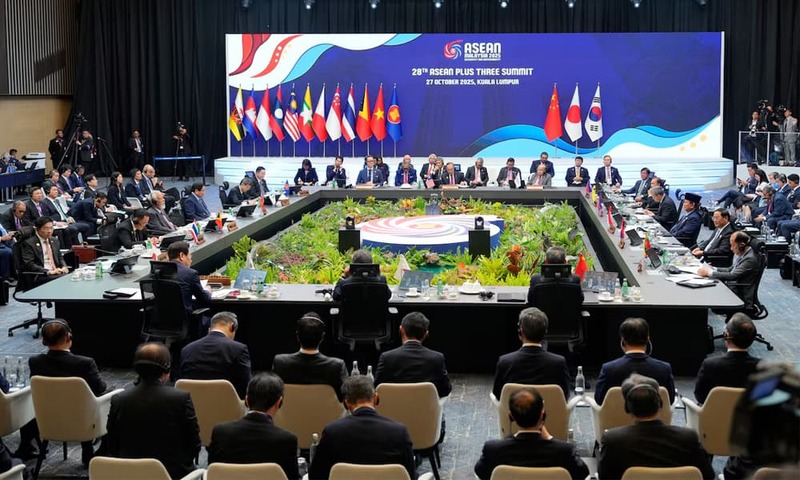KUALA LUMPUR: China pressed on Monday for open trade and stronger economic ties at a regional summit in Malaysia dominated by the shadow of steep US tariffs, as Canada’s premier expressed readiness to meet US President Donald Trump to defuse trade tensions.
A day after Trump’s six-hour blitz of meetings and trade announcements at the Association of Southeast Asian Nations summit in Kuala Lumpur, Chinese Premier Li Qiang called on regional leaders to uphold free trade and oppose protectionism, a phrase China has used to call out Trump’s tariffs.
“We must fully safeguard the hard-earned peace and stability in East Asia,” Li said at a meeting of ASEAN, Japan, China and South Korea.
He urged countries to “uphold free trade and the multilateral trading system, oppose all forms of protectionism, and continuously advance regional economic integration”.
In a flurry of deal-making on his first stop of a five-day tour of Asia, Trump on Sunday oversaw the signing of an expanded ceasefire he brokered between Cambodia and Thailand and trade framework agreements with four countries, none of which reduced import tariffs, though they left room for exemptions.
Canada’s Prime Minister Mark Carney on Monday said his government was working to secure trade deals in the Indo-Pacific and expected to meet Chinese President Xi Jinping on the sidelines of the APEC meeting in South Korea this week.
Carney said he was also open to meeting Trump, who has been incensed over a tariff-related Ontario political ad that has complicated their delicate trade negotiations.
“We stand ready to sit down with the United States, myself, with the president, my colleagues, with their colleagues, when the US is ready to sit down,” Carney told a press conference, adding he had not seen specifics on the additional 10% that Trump said he would impose on Canadian goods following the ad.
But while en route to Japan on Monday, Trump said he did not want to meet Carney, adding, “I’m not going to be meeting with him for a while.” Brazilian President Luiz Inacio Lula da Silva on Monday struck a positive tone on his country’s tariff tensions with the United States and said his meeting with Trump a day earlier “guaranteed” a more favourable trade deal than the current 50% tariff on Brazilian goods.
“I told him it was extremely important to take into account Brazil’s experience as the largest country in South America,” Lula, as he is popularly known, told a press conference.
While China’s premier and leaders of Brazil, Canada, the European Council and the 11-strong ASEAN bloc were at events seeking to solidify economic partnerships and hammer out trade pacts, the United States was represented on Monday by two lower-profile officials in Kuala Lumpur. The China-backed Regional Comprehensive Economic Partnership, comprised of ASEAN states, Australia, Japan, New Zealand and South Korea, held its first summit since 2020 and called for wider trade efforts and the faster addition of new members.
The world’s largest trading bloc, RCEP covers about 30% of global gross domestic product and is touted by some analysts as a potential buffer against US tariffs.
European Council President Antonio Costa said the European Union would look to finalise trade agreements with Malaysia, Thailand and the Philippines soon. Costa met China’s Li and said he conveyed strong concern about Beijing’s expansion of export controls on critical raw materials and said a high-level delegation from China would be in Brussels in the coming weeks.


